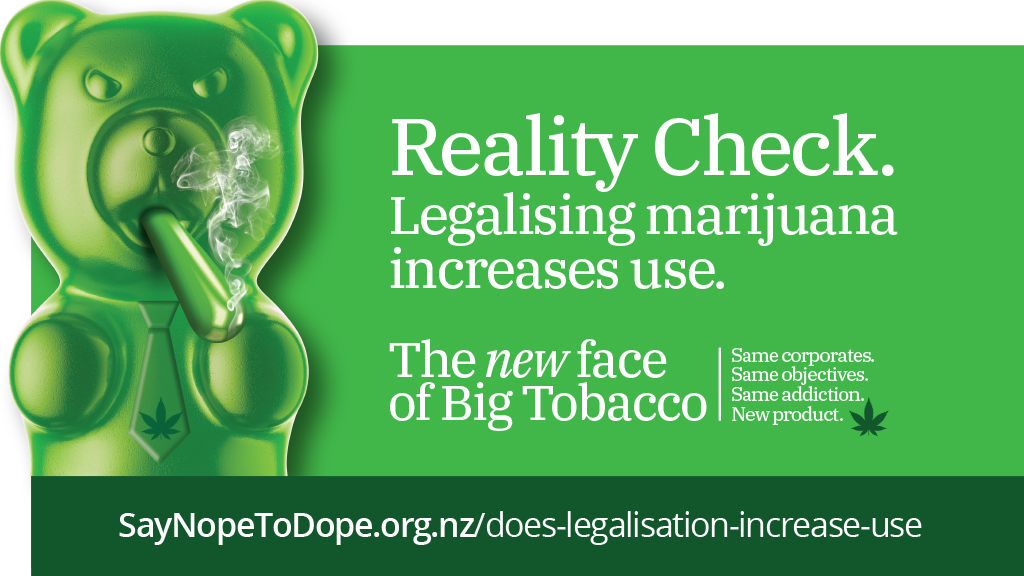
Legalising cannabis doesn’t make teens want to smoke it – study
NewsHub 9 July 2019
Family First Comment: “It simply confirms that New Zealand would do well to wait and watch. At the end of the day, it’s a society-wide policy that will affect all age groups.”
New research finding legalising cannabis doesn’t result in more teens taking up toking has been dismissed by opponents of the widely-used drug.
Researchers in the US looked at 25 years of survey data in 33 states, including 27 which have legalised medicinal use and seven where it’s legal to smoke for fun. All-up 1.4 million high school students’ responses were looked at.
According to the findings, published Tuesday (NZ time) in journal JAMA Pediatrics, there was no link between legalisation for medicinal or recreational purposes and increased rates of teenage cannabis use. In fact, they found the opposite.
“Recreational marijuana laws appear to be associated with a decrease in the odds of both measures of marijuana use, which may be because it is more difficult for teenagers to get marijuana if drug dealers are replaced by licensed dispensaries that require proof of age,” the Montana State University researchers said in a statement.
Skepticism from opponents
But conservative lobby group Family First says the study has flaws – the Youth Risk Behavior Survey (YBRS), from which the researchers pulled their data, only covers teenagers who go to school.
“All YRBS data is also self-reported, and underreporting or overreporting of behaviours cannot be determined,” said national director Bob McCoskrie, who also took aim at one of the groups which funded the study.
“The Koch Foundation is pro-cannabis law reform.”
He said the latest study “goes against other governmental evidence showing higher usage rates in legalised states”, citing data collected by the National Survey on Drug Use and Health (NSDUH) – an annual survey run by the US government.
“Colorado, where recreational marijuana has been legal since 2012, has the highest rate of first-time marijuana use among youth,” said McCoskrie.
The NSDUH data shows use in states where it’s legal is generally higher than where it isn’t across all age groups, including youth. But states where cannabis was popular when illegal were arguably the most likely to vote for legalisation in the first place.
The NSDUH data also shows that in Colorado – the first state to legalise cannabis – first-time use rates amongst 12- to 17-year-olds are in fact the highest in the country, as McCoskrie says.
But past data collected by the NSDUH also shows since 2012, usage rates amongst 12- to 17-year-olds in Colorado has fallen. In 2012 17.6 percent of 12- to 17-year-olds reported using cannabis in the previous year, and 10.47 percent in the previous month.
By 2017, those rates had fallen to 16.97 and 9.02 respectively – backing up what the latest study has found. Across the US, the data shows past-month use for teenagers falling from 9.82 percent to 6.46 percent, and past-year from 13.86 to 12.19.
“Yes – overall use around the US is reducing in parts of that specific age group – but legalised states continue to buck the speed of that trend,” McCoskrie replied.
“It simply confirms that New Zealand would do well to wait and watch. At the end of the day, it’s a society-wide policy that will affect all age groups.”
National drug reform spokesperson Paula Bennett echoed McCoskrie, saying flatlining use was not an argument in favour of legalisation.
“This doesn’t align with the Government’s intention of minimising harm, as drug use hasn’t decreased but instead stayed the same,” she told Newshub.
“There is also mixed evidence on how prevalent the black market still is. There are some places where the use of the black market has increased, especially when people can obtain a cheaper product with a higher potency.”
She said more time was needed to evaluate the effects of legalisation in Colorado and Canada “so we can make the best-informed decision before we go ahead with legalising recreational marijuana”.
Bennett in May declined invitations to debate Swarbrick on cannabis legislation, saying a “‘for and against’ argument at this time is not the best way for the public to get the best information”.
READ MORE: https://www.newshub.co.nz/home/new-zealand/2019/07/legalising-cannabis-doesn-t-make-teens-want-to-smoke-it-study.html
> 
